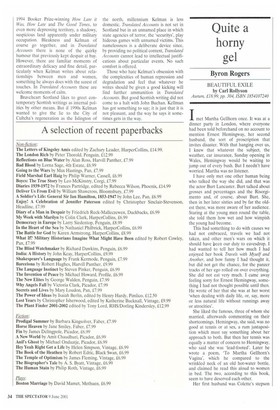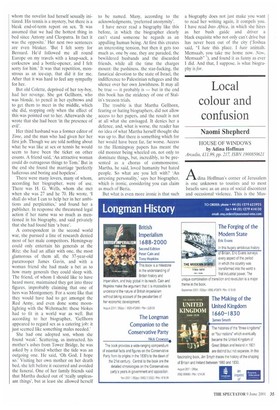Quite a horny gel
Byron Rogers
BEAUTIFUL EXILE by Carl Rollyson
Aurum, £18.99, pp. 304, ISBN 1854107240
Imet Martha Gellhorn once. It was at a dinner party in London, where everyone had been told beforehand on no account to mention Ernest Hemingway, her second husband, the sort of proscription that invites disaster. With that hanging over us, I knew that whatever the subject, the weather, car insurance, Sunday opening in Wales, Hemingway would be waiting to jump out of every bush. But I needn't have worried. Martha was no listener.
I have only met one other human being who talked the way she did, and that was the actor Burt Lancaster. Burt talked about grosses and percentages and the Risorgimento and, of course, about Burt. She, then in her later sixties and by far the oldest there, was more aware of her audience. Staring at the young men round the table, she told them how wet and how wimpish the young had become.
This had something to do with causes we had not embraced, travels we had not taken, and other men's wars on which it should have been our duty to eavesdrop. I had wanted to tell her how much I had enjoyed her book Travels with Myself and Another, and how funny I had thought it, but did not get the chance, for the panzer tracks of her ego rolled on over everything. She did not eat very much. I came away feeling sorry for Ernest Hemingway, something I had not thought possible until then. He wrote of her that she was at her worst 'when dealing with daily life, or, say, more or less natural life without runnings away or atrocities'.
She liked the famous, three of whom she married, afterwards commenting on their shortcomings. Hemingway, she said, was no good at tennis or at sex, a rum juxtaposition which must say something about her approach to both. But then her tennis was equally a matter of concern to Hemingway, who said she was 'lead-footed'. Later he wrote a poem, 'To Martha Gellhorn's Vagina', which he compared to the wrinkled neck of an old hot-water bottle, and claimed he read this aloud to women in bed. The two, according to this book, seem to have deserved each other.
Her first husband was Colette's stepson whom the novelist had herself sexually initiated. His tennis is a mystery, but there is a bleak end-of-term report on sex. 'It was assumed that we had the hottest thing in bed since Antony and Cleopatra. In fact it was the opposite. Her next two sentences are even bleaker. 'But I felt sorry for Bernard. He'd followed me all round Europe on my travels with a knap-sack, a corkscrew and a bottle-opener, and I felt sorry for him.' It was that repetition, monstrous as an ice-cap, that did it for me. After that it was hard to feel any sympathy for her.
But old Colette, deprived of her toy-boy, had her revenge. She got Gellhorn, who was blonde, to pencil in her eyebrows and to get them to meet in the middle, which she did, stopping only when the effect of this was pointed out to her. Afterwards she wrote that she had been 'in the presence of evil'.
Her third husband was a former editor of Time, and the man who had given her her first job. Though we are told nothing about what he was like at sex or tennis he would seem to have been the ticket on other counts. A friend said, 'An attractive woman could do outrageous things to Tom.' But in the end she found the marriage 'perfectly ludicrous and boring and hopeless'.
There were many lovers, many of whom, according her biographer, were of use. There was H. G. Wells, whom she met when she was 27 and he 70. He wrote, 'I shall do what I can to help her in her ambitions and perplexities,' and found her a publisher. In response she threatened legal action if her name was so much as mentioned in his biography, and said privately that she had found him 'a bore'.
A correspondent in the second world war, she pursued a line of research denied most of her male competitors. Hemingway could only entertain his generals at the Ritz: she had an affair with one, the most glamorous of them all, the 37-year-old paratrooper James Gavin, and with a woman friend she had made a bet as to how many generals they could sleep with. The friend, of whom I should like to have heard more, maintained they got into three figures, improbably claiming that one of hers was Montgomery. For a score like that they would have had to get amongst the Red Army, and even done some moonlighting with the Wehrmacht: these blokes had to fit in a world war as well. But according to her biographer, 'Gellhorn appeared to regard sex as a catering job: it just seemed like something males needed.'
She had one adopted son, whom she found 'weak'. Scattering, as instructed, his mother's ashes from Tower Bridge, he was asked by a friend whether the tide was an outgoing one. He said, 'Oh God, I hope so.' Visiting her own mother on her death bed, she left before it occurred and avoided the funeral. One of her family friends said that Martha ducked out of 'really unpleasant things', but at least she allowed herself to be named. Many, according to the acknowledgments, 'preferred anonymity'.
I have never read a biography like this before, in which the biographer clearly can't stand someone he regards as an appalling human being. At first this creates an interesting tension, but then it gets too much as, one by one, they are paraded, the bewildered husbands and the discarded friends, while all the time the charges mount: the pushiness, the star-fucking, the fanatical devotion to the state of Israel, the indifference to Palestinian refugees and the silence over her own Jewishness. It may all be true — it probably is — but in the end this book has the stridency of one of Stalin's treason trials.
The trouble is that Martha Gellhorn, fearing or hating biographers, did not allow access to her papers, and the result is not at all what she envisaged. It denies her a defence. and, what is worse, the reader has no idea of what Martha herself thought she was up to. But there is something which for her would have been far, far worse. Access to the Hemingway papers has meant the old monster being wheeled on, not only to dominate things, but, incredibly, to be presented as a chorus of commonsense. Martha, he said, loved humanity but hated people. So what are you left with? 'An arresting personality,' says her biographer, which is ironic, considering you can claim as much of Beria.
But what is even more ironic is that such
a biography does not just make you want to read her writing again, it compels you. I have read Into Africa, in which she hires as her bush guide and driver a black exquisite who not only can't drive but has never been out of the city ('Joshua said, "I hate this place. I hate animals. Memsaab, you take me home now. Now, Memsaab" '), and found it as funny as ever I did. And that, I suppose. is what biography is for.



































































 Previous page
Previous page